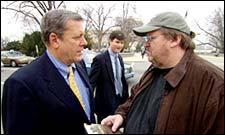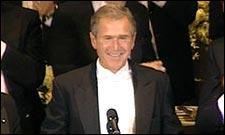 Michael Moore who, while accepting the Best Documentary Oscar Award for his film, Bowling For Columbine, denounced US President George W Bush for planning a 'fictitious war' against Iraq, doesn't like his films to be called documentaries. He prefers 'non-fiction films'.
Michael Moore who, while accepting the Best Documentary Oscar Award for his film, Bowling For Columbine, denounced US President George W Bush for planning a 'fictitious war' against Iraq, doesn't like his films to be called documentaries. He prefers 'non-fiction films'.
Creative non-fiction films would be a better way to describe them, particularly his latest triumph, Fahrenheit 9/11.
But his critics may want to call them fictitious documentaries. The talented Moore goes too far in his new film by manipulating details to create a larger picture of an America dominated by a war-mongering President who seems to be working so little himself but grandly sending off young men, especially from the minorities, to die in Iraq.
| |||||||||||
Given the film's creativity and the widely prevalent anti-Bush feelings in Europe and at the Cannes Film Festival, it wasn't surprising to see it win the top award at Cannes.
But a month has passed between Cannes and the American premiere of the film and some people, including those who do not like Bush, have pointed out the manipulative nature of the film in media discussions.
Even if I had not read Moore's critics and reviewers who have written elaborately on how he conveniently misleads the audience, I would have spent time wondering what was true and what wasn't.
Christopher Hitchens, a controversial filmmaker and writer who denounced Mother Teresa in his documentary as a 'saint from hell,' complained that in the shot which shows Bush at a golf club espousing war, Moore conveniently ignores the fact that British prime minister Tony Blair was also present. In short, it was more of a working holiday for Bush.
Despite what you have read about the film, it will startle you by the way it has been photographed and edited, and the superb way Moore uses music to enhance the effect.
 By now, we have seen Moore in several films almost like a stalker asking powerful men and women inconvenient questions. His deadpan face doesn't show any reaction when he shames his subjects. Even then, one enjoys this ploy once again. This time, he goes around asking Washington lawmakers to sign an imaginative legislation that would send their children to fight in Iraq.
By now, we have seen Moore in several films almost like a stalker asking powerful men and women inconvenient questions. His deadpan face doesn't show any reaction when he shames his subjects. Even then, one enjoys this ploy once again. This time, he goes around asking Washington lawmakers to sign an imaginative legislation that would send their children to fight in Iraq.I don't know how Moore managed to get it done, but the footage of Bush's dazed reaction on September 21, 2001 morning after learning of the attack on World Trade Center is shockingly riveting. Bush is in a Florida classroom when the devastating news is conveyed to him. Instead of immediately reaching his advisers and the Vice President, he sits quietly for several minutes, dazed and dumfounded. But after a few minutes, he gains his composure and reads My Pet Goat to the children. Imagine the sequence being used as an election ad.
The inhumanity of war is well conveyed with the footage of wounded and dead soldiers, and also through interviews with the military personnel whose views have now turned against the war.
Though Moore is often mean spirited, he is also funny and engrossing. Watch out for the scene that reveals the secret of how Paul D Wolfowitz, perhaps the most important architect of the Iraq invasion, maintains his hair.
Despite its black humour and polemics, and its laboured effort to show the business ties between the Saudi royal families and the Osama bin Laden family on one hand, and the Bush family on the other, the film triumphs in its reportage of ordinary Americans who react to the calamitous events. Though we hardly get to see people who believe in Bush and the war, there surely must be millions who do so.
And yet, those who share with Moore their sorrow and anger over the expansion of the American empire should kindle, if nothing else, another round of debate over American destiny.
CREDITS:
Writer-Director: Michael Moore
Running time: 115 minutes
Rating: R for graphic war scenes
Distributor: Lions Gate Films and IFC Films








More from rediff